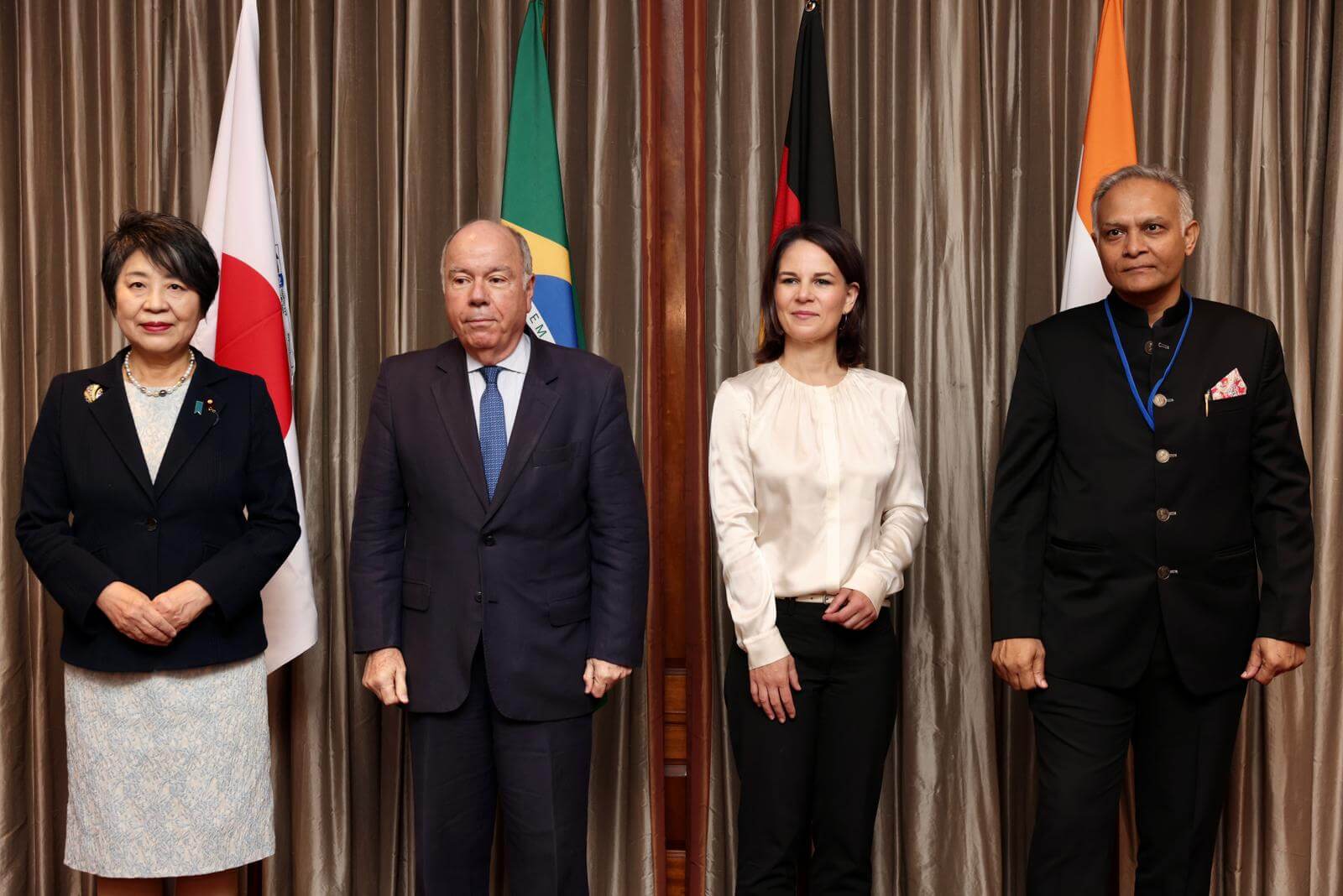The Foreign Ministers of India, Brazil, Germany, and Japan, which constitute the G4, met on the sidelines of the UN General Assembly’s (UNGA) 78th session and discussed the reformation of the UN Security Council (UNSC), emphasising the significance of expanding membership in permanent and non-permanent categories to make the organisation legitimate and effective.
Overview
Brazilian Foreign Minister Mauro Vieira, German Federal Foreign Minister Annalena Baerbock, Japanese Foreign Minister Yoko Kamikawa, and Indian Ministry of External Affairs Secretary (West) Sanjay Verma assessed the current state of the negotiations for the reforms.
The joint statement released after the meeting noted that the Ministers reiterated that multilateralism is under significant pressure due to multiple complex challenges.
Furthermore, they acknowledged that the UNSC’s inability to address contemporary global concerns effectively and timely emphasises the “urgent need for its comprehensive reform so that it better reflects contemporary geopolitical realities.”
In the statement, the Ministers concurred that the “expansion of the UN Security Council in both permanent and non-permanent categories of membership is essential to make the body more representative, legitimate, effective and efficient.”
The group noted that several UN Member States have explicitly expressed the need for UNSC reform, and the Ministers highlighted the need for progress in negotiations on this critical and urgent subject.
“Recognizing the historical injustice with regard to representation in the Security Council, they underlined the importance of increasing participation of under-represented and unrepresented groups and regions, such as Africa and Latin America and the Caribbean,” the statement read.
The G4 Foreign Ministers also expressed serious concerns over the absence of substantial progress on Security Council reform in the IGN (Intergovernmental Negotiations framework).
Consequently, the Ministers noted the “Co-Chair’s proposal for a structured dialogue on individual models proposed by States and Groups and encourage renewed efforts by the PGA and the Co-Chairs to commence text-based negotiations without any further delay in the IGN.”
In their concluding remarks, the Ministers stated that the “future of international governance structures rest on their capacity to adapt and remain fit for purpose. The longer it takes to reform the UN Security Council, the more its effectiveness will be called into question.”
What is G4?
The G4 is a group comprising Brazil, Germany, India, and Japan, all of which intend to become permanent members of the UNSC. The G4 nations support one another’s bid for permanent membership in the UNSC.
Since the UN’s formation, all four nations have been elected non-permanent members of the Security Council.
Additionally, the G4 nations regularly convene on the sidelines of the annual high-level UN General Assembly session.
L-69 Group Addresses UNSC Reforms
The Foreign Ministers of the L-69 Group of Nations met on Thursday to discuss views on UNSC reform. The leaders described UNSC expansion in permanent and non-permanent membership categories as “essential” for making the body “more representative, legitimate, and effective.”
The L-69 group comprises developing countries from Asia, Africa, Latin America, the Caribbean, and the Pacific (Small Island Developing States).
The ministers agreed that the world’s increasingly complex and interconnected challenges highlight the importance of reforming the UNSC to “better reflect contemporary geopolitical realities and to enhance its legitimacy, effectiveness, and implementation of its decisions,” the statement read.
According to the L-69 ministerial joint press statement, the ministers “reiterated their expectation that the ongoing Intergovernmental Negotiations (IGN) process on UNSC reform will commence negotiations based on a single consolidated text, with the aim of delivering concrete outcomes within a fixed time frame.”
The Ministers concluded by emphasising the need for developing nations to expand their involvement and presence in the Council in order to strengthen the group’s ability to respond effectively to the diverse, complex, and growing challenges that contemporary society faces on issues of international peace and security.
G4, L-69 Countries Underline Importance of Security Council Expansion on UNGA Sidelines
The group noted that several Member States explicitly expressed the need for UNSC reform; the Ministers highlighted the need for progress in negotiations on this critical and urgent subject.
September 22, 2023

IMAGE SOURCE: TWITTERMeeting of the Foreign Ministers of the G4 Countries on UN Security Council Reform.
